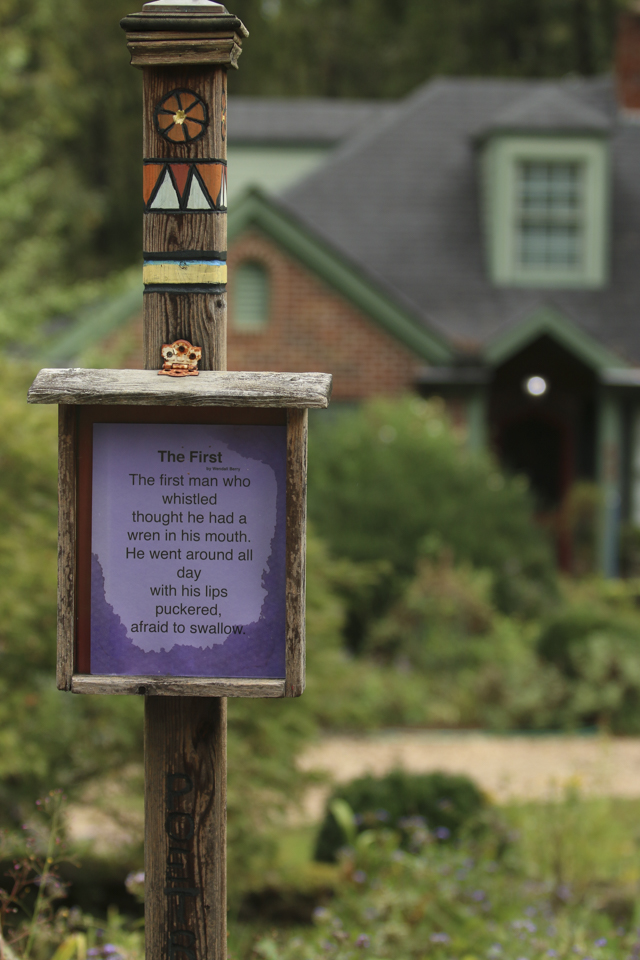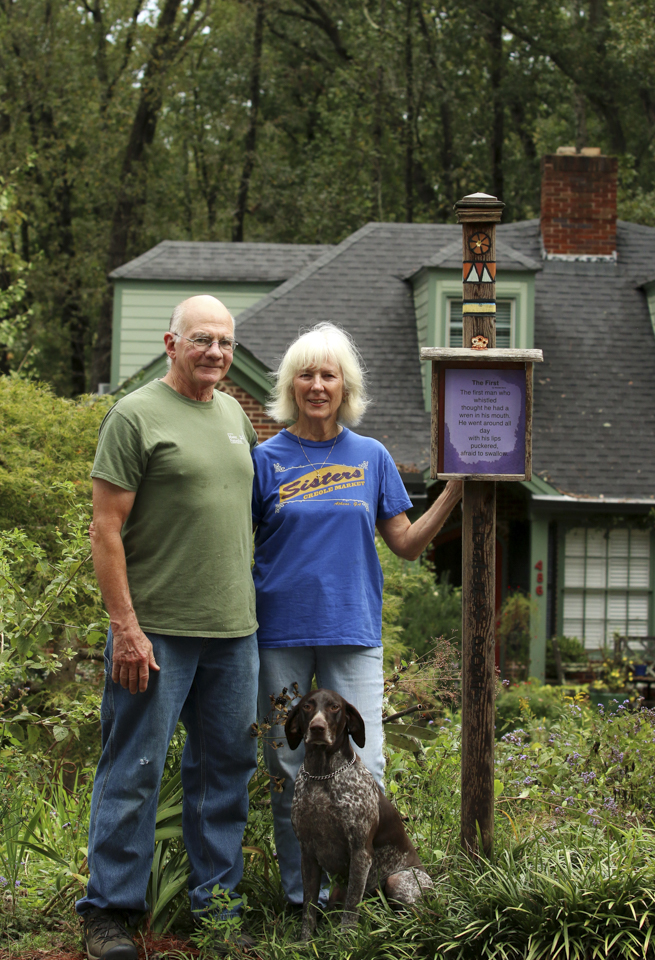Your home is your castle, and staking a sign in the front yard is akin to hoisting a crest above the ramparts. Some signs are celebratory—It’s a girl! Tyler’s on the football squad! Look who’s 40! In today’s political climate, signs can also be tribal markers. Others indicate changes in the community: Estate sale. Renovation on the way. Public hearing. Lookie-loo neighbors pause their jogs and dog walks to get the dish.
That’s exactly what my husband and I did after we moved to Athens, Georgia, a few years ago, assuming a sign in front of the redbrick cottage in our neighborhood portended another tear-down or expansion. But the sturdy beam supporting the glass-covered sign proved to be carved and painted, totem-like, and inside the box at the top was a sheet of paper that contained not building permits but verse. Etched into the signpost was an inscription that explained it all: Poetry Post.
Lili Ouzts is the keeper of the Poetry Post. She’s posted poems for four years now, inspired by a similar sign she spotted when visiting her stepdaughter in Portland, Oregon. “You’ve got to see this thing, Harvey,” she told her husband, delighted by the unexpected public display of verse. “I could build you one,” he offered. When they got back to Athens, he did.

Photo: Christina Matacotta
The Poetry Post.
“We have lots of books,” she says. “Lots of poetry books.” They are readers. It’s a second marriage for both, and they merged libraries and families when they wed in 2000. Between them they have six children, eleven grandchildren, and rooms lined with bookshelves. They’re Georgia natives and, except for college, and a year in New York City for Lili, they have lived here all their lives.
Harvey loves literature so much that in his sixties he retired from work as a cardiologist to go back to school to earn an English degree, sitting in freshman lecture halls at the University of Georgia taking undergrad courses because he wanted to be “fully educated.” He took part in that modern college ritual—studying abroad. During a stint in Oxford, England, Harvey pored over Shakespeare and the Romantics. Lili came along for the trip, volunteering in the Oxford Botanic Garden. “It’s amazing how deep and rich the soil is after more than four hundred years of gardening,” she says.
For Harvey, the call of the heart—literally—outweighed a full-time career in literature. He now works several days a week in cardiology, leaving time for travel, family, retreats to their rural Georgia farm, and reading. The couple has discovered poems together, looking through their shelves, taking suggestions. Before it went off the air, Garrison Keillor’s “Writer’s Almanac” was a go-to source. A neighbor offered a poem written by her mother, who had recently died, and it was posted for several weeks as a tribute. Another neighbor brought a poem written by her boyfriend. “It was a bit political,” says Lili. “We kept it up for three days to be polite and because she’d gone to the trouble, but this is not about politics.” The purpose of the post is not to preach, but to share that same sense of delight Lili experienced in Portland.
Her immediate neighbors seemed bemused by the project. “They’ll see me go out there and say things like ‘Oh Lord, another poem!’’’ says Lili. But friends come by to see the latest selection and complain if the Post isn’t updated. “People like to drive by and roll down their windows and read from their cars,” she says. “They bring their children and make them read the poems.”
To fit into the post, and allow for drive-by reads, the poems need to be short. Lili, an avid gardener who studied biology in college and worked in healthcare before staying home to raise her children, says that while maintaining the Post she has become a fan of Wendell Berry, the Southern poet, novelist, and naturalist. In his work, the spheres of biology and language intersect.
I walked by the Poetry Post this morning, and this Berry poem was framed in its glass:
The First
The first man who whistled
thought he had a wren in his mouth.
He went around all day
with his lips puckered,
afraid to swallow.
And like that, I was transported from my morning routine and to-do lists and from the silent screaming of this election year’s political signs. I walked home with visions of that man and that wren and wished that I could whistle.








